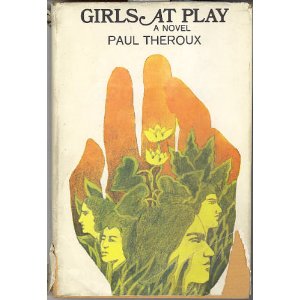Rereading Paul Theroux's (Malawi 1963-65) Girls At Play
I have been working my way through a new collecting of short stories by Paul Theroux, Mr. Bones: Twenty Stories, which Houghton Mifflin Harcourt published this September. Only one of the stories (so far) relates to his time in Africa. It is entitled, “I’m the Meat, You’re the Knife.” It is the last story in the collection. (Writers–or perhaps their editors–) selected the best stories for the first and last ones in any collection.
I first read Girls At Play in the late Sixties. This novel was his third. His first book was Waldo (1967), next three were set in Africa. Fong and the Indians (1968), Girls at Play (1969), and Jungle Lovers (1971). At the time, I remember reviewers were saying Theroux was ‘writing too fast,’ that he should slow down his publishing. At the same time Saturday Review called Fong and the Indians “a small masterpiece.” (If he had written slower perhaps the book would have been a ”big” masterpiece.)
When Girls at Play was published Theroux was twenty-seven. He had spent five years in Africa, first in Malawi (then known as Nyasaland) and later, after his Peace Corps tour, at Makerere University in Uganda, at the time the finest university in Africa. In Malawi he taught English at a secondary school, and also wrote textbooks. In Uganda he was, I believe, a Lecturer in the Department of Extra-Mural Studies, or perhaps, the Director of the University’s Adult Studies. (He is given credit with both titles in various publications.) He would leave Africa to go to Asia and become a Lecturer in 17th-Century Literature at the University of  Singapore.
Singapore.
When he was in Uganda he met and became friends with V.S. Naipaul (at least for a while) and also he met his first wife, Anne Castle, a Brit, who was a secondary school teacher in an upcountry Kenya girl’s school.
I mention that because Girls at Play is set in a remote Kenya girls’ school and focuses on four women. A Miss Poole, the Headmistress, who was born in Africa and can’t live anywhere else. Heather Monkhouse, who escapes the dull life of London, for Africa. Another young, wealthy British woman, and Bettyjean Lebow–B.J. to her friends–who is a Peace Corps Volunteer from San Diego and who, Theroux writes, “has difficulty reconciling her Hollywood fantasies of Africa with her liberal outlook.”
Theroux writes an Author’s Note saying “In Kenya, two hundred miles from Nairobi, on the Kampala Road, there is a high cool place which is still called by some ‘the White Highlands.’ My wife tells me there is a girls’ school there, but I have never seen it, and neither has she.”
Clearly, Paul is distancing himself from any ‘real’ women teachers at his wife’s school. He adds: “The school and all the girls in this book are fiction.”
The ‘girls’ in this book are not students. In fact, there are no students in this book. The ‘girls’ are the four teachers who Theroux writes, “white women in Africa appear strikingly girlish-even the middle-aged ones.”
Then he goes onto write: “it would be misleading for me to suggest that the teachers in this book are different from others in Africa.”
Theroux is not kind to ‘white women’ or for that matter, an old colonialist who, Theroux describes as, “a drunkard living unwashed in the East African bush,” or for that matter, is he kind to the three central African characters: Rose, an African albino girl, and two cousins, Wangi and Wilbur. They all fit into the well-constructed plot and as the cover copy sums up, “the sardonic humor that characterizes the earlier chapters explodes into a denouement of ferocious violence.”
What was interesting to me, re-reading this novel, was to look back and compare my teaching at a secondary school in Addis Ababa, Ethiopia, with the ‘girls’ of this novel, and also to read again how Theroux characterized the PCV from San Diego, B.J. Lebow, as well as, his ‘take’ on the Peace Corps in those first years of the agency in Africa.
—
End of Part I
John – Thanks for this info and insight on Theroux’ new book. I think you will like parts of the fourth book I am writing because several initial chapters take place in Addis. Most of the book dwells on Somalia’s turmoil in the early 1990s.
The upheaval in Burkina Faso over the past week is such that I may some day write about that too. Best, Mark